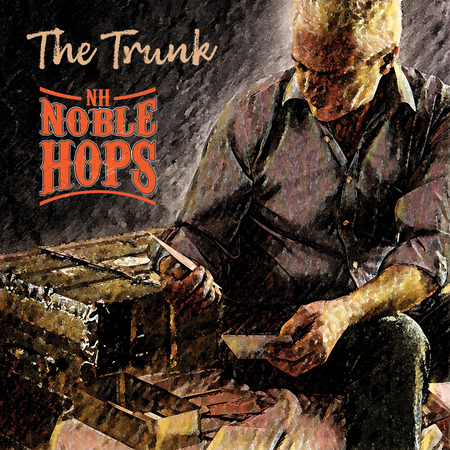
There’s a line near the end of “The Trunk” where Utah Burgess sings, “I’ll be me for me.” It sounds simple enough, but that’s the whole damn point—after three and a half minutes of generational heartbreak, war trauma, and working-class grit, he lands the plane on something that feels almost revolutionary in its humility. Be yourself, not the machine that made you. Not your father’s shadow. Not the government’s guilt. Just you.
Noble Hops don’t play rock and roll so much as they bleed it. The guitars don’t shimmer—they snarl like worn-out carburetors on a steel mill parking lot. Burgess’ voice isn’t polished, but it doesn’t need to be. It’s that ragged barroom instrument that tells you this guy has seen some things, maybe too many. There’s a whole lot of Springsteen in there, sure, but also Mellencamp’s corn-fed realism and even a whiff of Woody Guthrie’s righteous anger filtered through fuzz pedals and Pennsylvania rust.
“The Trunk” is less a song than a confession dressed up in power chords. It opens like a movie you’ve stumbled into halfway through: a son finds a box of his father’s past—letters, photos, ghosts—and suddenly the family history spills out like smoke from an oil drum fire. Vietnam, PTSD, factory layoffs, divorce—it’s all there, but Burgess doesn’t sermonize. He just holds up the mirror and says, “Here. This is what we did to each other. This is what’s left.”
https://open.spotify.com/track/68YDSOjR85AIWlLqJbhI4V?si=8f43abdabcea4653
And let’s talk about that rhythm section: Johnny “Sleeves” Costa on bass and “The” Brad Hulburt on drums drive this song like a midnight Greyhound bus, steady and relentless. Tony Villella’s lead guitar licks dart in and out like memories you can’t quite forget, and producer Jazz Byers adds just enough acoustic backbone to keep the whole thing from toppling over into despair.
What makes “The Trunk” special isn’t just its craftsmanship—it’s the honesty. In an age of auto-tuned sincerity and digital gloss, Noble Hops sound like men who’ve actually lived the songs they write. There’s no irony here, no posturing, just the plainspoken ache of people trying to make sense of where they came from and what it cost.
You can’t fake this kind of truth. You either lived it… or you didn’t. And Noble Hops? They damn sure did.
–Leslie Banks
